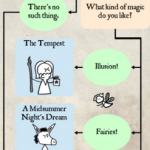The quote is from Company, the subject is Passion, as the Sondheim Symposium goes on. This installment includes spoilers for 1984.

At the climax of 1984, Winston is broken by the tortures in room 101. The moment that anihilates him and represents victory for Big Brother is the moment where he cries out:
Do it to her! Do it to Julia! I don’t care what you do to her, but do it to her! Tear her face off! Do it to Julia, not to me! Do it to Julia! Not me!
If this is betrayal, we might assume that true love would be offering to be tortured in order to spare Julia her suffering. And, that, presumably, would be a beautiful and triumphal moment.
But, in Passion, when Fosca says to Giorgio “Would Clara give her life for you? Would she? I would. Happily,” he recoils (as does the audience). What we expect to hear as the fulfillment of long love and intimacy is offered to Giorgio as an unasked for and unwanted gift. Who could have the temerity to die for you without your permission?
Look at the lyrics of Giorgio’s rebuke to Fosca and listen to “Is this what you call Love?” below. (audio only, sadly)
After I saw Passion in college, I felt sick. When we discussed our impressions of the show in my Sondheim seminar, my hand was first in the air and I blurted out, “This is the most effective Nietzschean propaganda about the horror of the weak subduing the strong by virtue of their weakness I could possibly imagine.” What I didn’t say, thinking it was a little much for a seminar, was “This show is the clearest summary of what creeps me out about Christianity.”
Giorgio’s declaration that:
Love’s not a constant demand,
It’s a gift you bestow
Love isn’t sudden surrender
It’s tender and slow, it must grow.
could easily come out of the mouth of the Ghost in the “May I kill it?” scene in C.S. Lewis’s The Great Divorce. But his lines are contradictory. Love is a gift for Giorgio to bestow, confident it will be wanted and needed. But he won’t allow other people to take on the role of gift-giver without his permission. In fact, his assent is another gift for him give — allowing the other person to be generous to him.
What is subtext for Giorgio is often text for me. I empathized most with the Ghost who doesn’t want to enter heaven unless he can be of use. Giorgio and I are bad universalizers. We’re all right with an asymmetry of service as long as we’re the ones sacrificing more. So what can we do with the unfairness of grace? For us, the tempting error isn’t Lucifer’s non serviam, it is (to jump musicals) Javert’s inability to accept mercy.
http://www.youtube.com/watch?v=IFr6nk4ry4Y











